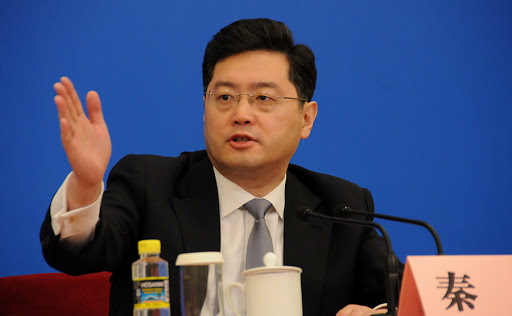U.S. and China to kick-start diplomatic ties with ambassador appointments even as ‘strategic competition’ deepens
Nicholas Burns and Qin Gang, both experienced diplomats, are widely expected to be named by Washington and Beijing to be ambassadors in the other capital. Their jobs will not be easy.

The U.S. and China will soon announce new envoys to Beijing and Washington. The two men reported to be in the wings are highly experienced diplomats, indicating a desire in both capitals to start fresh dialogue even as competition — and in the eyes of many, animosity — between the two governments intensifies.
- Nicholas Burns, 65, who the Wall Street Journal reports is “widely expected” to be named the next U.S. ambassador to China, is a veteran of the U.S. State Department from both the Clinton and George W. Bush administrations. Axios noted that by favoring a diplomat rather than a “big name” politician, Biden is breaking with recent convention — the last ambassador to Beijing, former Iowa governor Terry Branstad, suddenly quit without notifying his hosts to join the Trump campaign last September.
- Qín Gāng 秦刚, 55, is an “adept diplomat who has acted as…chief protocol officer” for Xí Jìnpíng 习近平, the WSJ reports. The U.S.-China Perception Monitor confirmed that pending “announcement and approval by the two governments,” Qin would be the next ambassador to the U.S.
Notably, neither man appears to specialize in studying the country where they may soon be posted. This is especially unusual for a Chinese ambassador to the U.S., and WSJ reporter Keith Zhai suggested that a “popular thinking” is that “China decided to let Mr. Qin to take on high-stakes issues of China-U.S. relationship with which he has little experience…because the leadership believes the bilateral relations might be better repaired and reset by someone new to the field.”
- But Qin projects strong opinions about Western countries. While his diplomatic style is “more tempered” than that of some of his high-profile “wolf warrior” colleagues, it is distinctly more assertive than that of outgoing ambassador Cuī Tiānkǎi 崔天凯, who was seen as a relatively calm and steady voice during his eight years in Washington. The U.S.-China Perception Monitor notes:
For example, Qin recently described countries that ‘smeared’ China for its human rights abuses in Xinjiang as “evil wolves” during a China-CEEC Summit press briefing. Later in March, Qin summoned the British Ambassador to China to condemn the U.K.’s sanctions against China over the human rights crisis in Xinjiang.
A smidge of climate cooperation, soon to be overwhelmed by “strategic competition”?
The U.S. and China are making progress on climate diplomacy. Chinese state media confirmed today that Xi Jinping will “attend and deliver an important speech” at the U.S.-hosted Leaders Summit on Climate tomorrow.
- This follows a productive trip by Biden’s climate envoy, John Kerry, to Shanghai last week, which ended in a significant joint statement.
- It remains to be seen, however, whether any new words from Xi, Kerry, or anyone else will significantly change the state of action on climate change.
Meanwhile, the “Strategic Competition Act of 2021” just flew through the U.S. Senate Foreign Relations Committee by a vote of 21-1, Reuters reports.
- The legislation, which has broad bipartisan support, frames relations with China in very adversarial terms.
- One of its largest line items besides funding for military programs, Axios reported, is “$300 million for the ‘Countering Chinese Influence Fund,’ to push back against the Chinese Communist Party’s efforts to promote its authoritarian model abroad.”






